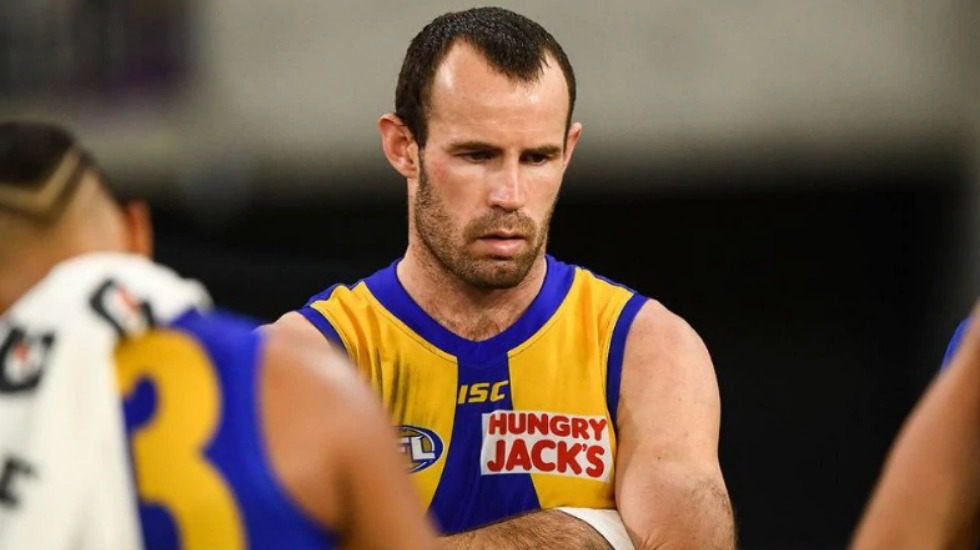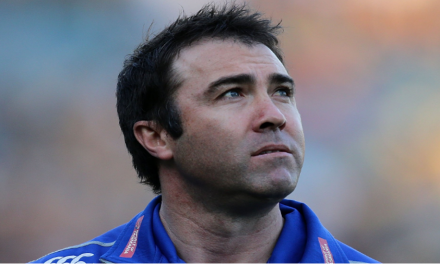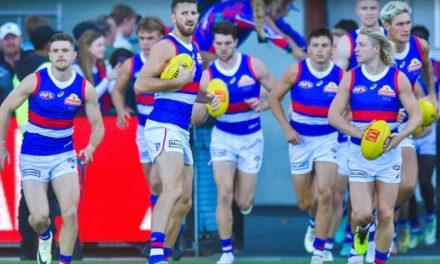Shannon Hurn remains on track for his quest for 300 games, despite hitting a snag on Saturday. Photo: AFL MEDIA
Glen Jakovich, Dean Cox, Peter Matera, Dean Kemp.
The long list of premiership heroes who each spent more than a decade at the forefront of West Coast’s repeated flag tilts goes on.
Ashley McIntosh, Darren Glass, Drew Banfield, Andrew Embley, Daniel Kerr, Mark LeCras, Ben Cousins. … you can keep scrolling.
Yet none of those Eagles champions are among the 91 existing members of the VFL/AFL ‘300 Club’.
In fact, West Coast is the only league club established before the turn of the century that is still yet to have a player join that elite group of ultra-durable stars.
Veteran defender Shannon Hurn is on the verge of becoming the first, but now faces a level of uncertainty in his pursuit of one of the game’s most respected milestones.
It was with a cruel twist of irony that Hurn injured a calf last week upon reaching a mark that highlighted his overall durability and longevity since being drafted in 2005.
Hurn equalled former ruck star Cox’s West Coast club-record 290 games in the defeat to St Kilda and had been set to soar past it on the path to 300 in Friday night’s blockbuster against Collingwood at Optus Stadium.
Alas, the 33-year-old will now have to wait at least another three or four weeks before resuming, but will still have the opportunity to reach 300 this season.
If he does, he’ll become just the third WA-based player to get there, behind Fremantle club legends Matthew Pavlich (353) and David Mundy (336*).
The fact no West Coast players – and very few Dockers – have passed 300 games might have something to do with them carrying what former Eagles fitness guru and University of Western Australia professor Brian Dawson used to refer to as “accumulated travel fatigue”.
It’s a phenomenon that isn’t accurately measurable, nor fully appreciated in Victoria and the eastern states, where rival clubs face a much lighter travel burden.
Perhaps one day it will be.
An estimate from Hurn’s career breakdown of matches shows him clocking about 700,000km travelled by air to and from away games to date.
Even with modern rehabilitation techniques, many experienced WA-based players are convinced about the toll travel takes on their bodies.
PLEASE HELP US CONTINUE TO THRIVE BY BECOMING AN OFFICIAL FOOTYOLOGY PATRON. JUST CLICK THIS LINK.
Hurn made his debut as an 18-year-old in 2006, just months before Cousins and Chris Judd led West Coast to its third flag.
The South Australian product went on to skipper the Eagles to their fourth premiership in 2018 and is now the fourth-oldest man in club history to have played a senior game, after Sam Mitchell (34 years, 339 days), Drew Petrie (34, 336) and current teammate Josh Kennedy (33, 228).
Hurn appeared as though he might have been caught by Father Time as he struggled through the early stages of a disrupted 2020 campaign.
The Eagles’ season ultimately ended in disappointment, but Hurn did enough in the back half to earn a new one-year deal and has since rekindled his career-best form.
He was ranked second in the AFL for metres gained this season before his calf injury, using new rules to his advantage to play on from kick-ins and use his booming right boot to his full advantage.
West Coast coach Adam Simpson, who played 306 games for North Melbourne, is tipping Hurn could carry on well beyond the 300-game mark and, in the process, achieve something none of the aforementioned Eagles greats could do.
“He’s been tremendous,” Simpson said last week.
“Last year, like a lot of our players, he was a bit rusty early. But this form this year he is back to his All-Australian best.
“His leadership hasn’t changed but his output has probably increased. He doesn’t look like he’s slowing down at all.”
Hurn will almost certainly pass Cox’s West Coast club record next month. If and when he passes 300 games, here’s hoping the tough and reliable frequent flyer gets his due recognition all over the country.












Fingers crossed Hurn hits those two milestones without any hiccups.
And the accumulated travel is more of an issue than certain teams playing at the MCG 13 times in a row. Fixture equality should have a focus on Victorian clubs leaving the state more than they do now.